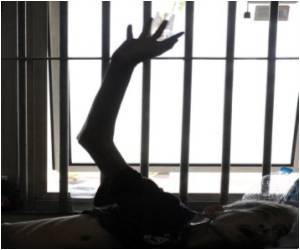
Sex between inmates, injecting drug use and tattooing are the main triggers for the spread, helped by overcrowding, corruption and poor access to condoms and anti-HIV therapy, said specialists at the International AIDS Conference here.
Katherine Todrys, who carried out a study for Human Rights Watch in six Zambian prisons, said that country did not even have a programme to test newly-admitted inmates for HIV.
"Currently there is no health screening whatsoever (for them)," she said.
Only 14 healthcare workers were available for 15,300 prisoners in Zambia's 86 jails, and caring for this population was limited essentially to distributing paracetamol, a pain reliever and fever reducer, she said.
For those diagnosed with HIV, many fail to get treatment because of "security fears, lack of transport and the decision of non-medical officers and other inmates", according to the HRW report.
Advertisement
In Nigeria, campaigners are barred even from distributing condoms in detention facilities, Emeka Chima, from the Society for Family Health, told AFP.
Advertisement
The UNODC chose the AIDS forum to launch a "toolkit" spelling out ways for governments to introduce HIV prevention and treatment systems in prisons.
"Health care in prisons should be at least equivalent to that in the community," it insisted.
HIV prevention in detention facilities can be hugely effective, the Open Society Institute (OSI) said, citing the case of Moldova, which introduced needle and methadone programmes in the late 1990s that now reach 75 percent of inmates.
Researchers from Brown University in the United States said HIV prevention was most effective when initiated behind bars.
For instance, prisoners who were started on methadone, a safer substitute for heroin, before their release were far likelier to stick to this regimen compared with counterparts who, after emerging from prison, were simply pointed in the direction of a counsellor.
Relapse -- in which an injecting drug user turned once more to illegal drugs -- increased the later risk of HIV infection through shared syringes.
"Virtually every prisoner and every person who's arrested for a drug offence will return back to their community," said Samuel Dickman, who conducted the investigation.
"This isn't just about prisoners. This is about communities prisoners return to."
Source-AFP














